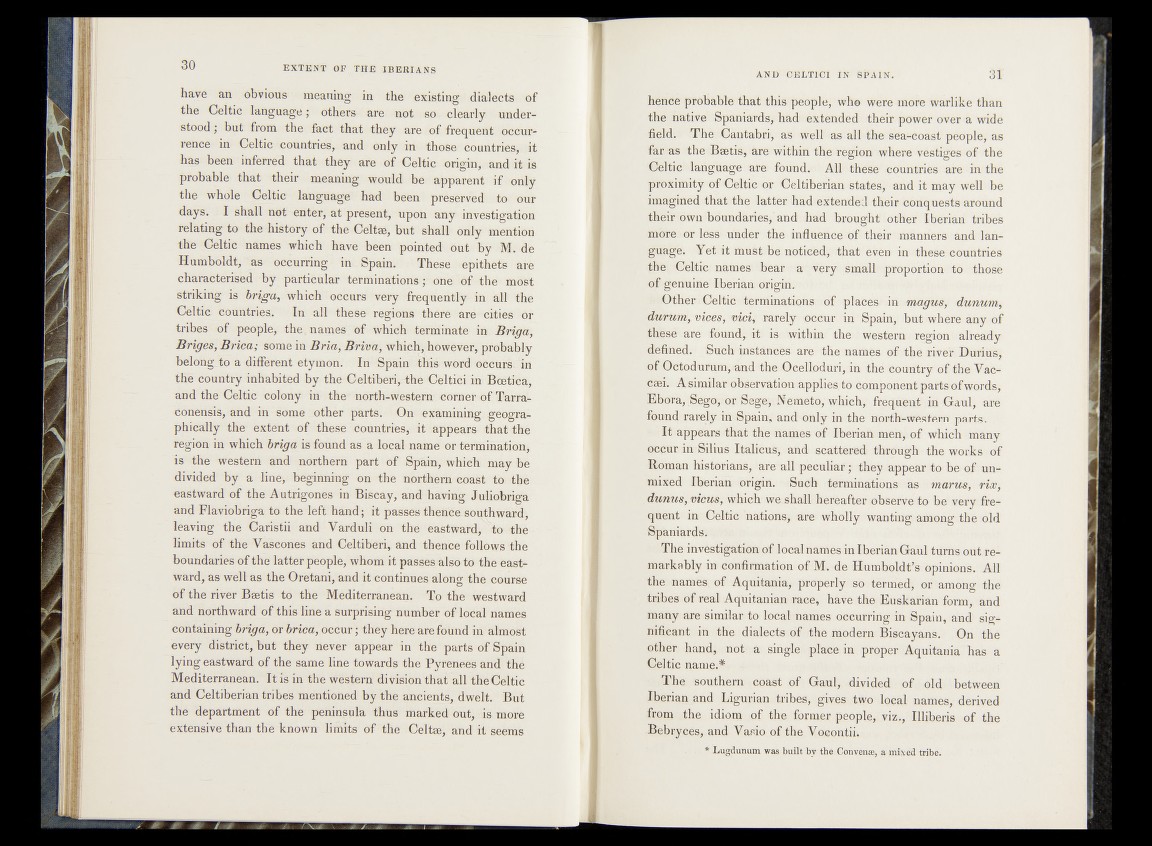
have an obvious" meaning- -in the existing dialects of
the Celtic language; others are not so-clearly- understood
; but from the fact that they are o f frequent occurrence
in- Celtic countries, and only in those- countries, it
h a s been inferred that they are of Celtic origin, and it is
probable that their meaning would be apparent if only
the whole Celtic la n g u ie had been preserved to our
days. I shall not enter, at present, upon any-investigation
relating to the history of-the Celtæ, but shall only mention
the Celtic names which have been pointed out by M; de
Humboldt, as occurring in Spain. These 4pithets are
characterised bÿ particular terminations one o f -thé', most
striking is briga, which occurs veiy frequently in all thé
Celtic countries. In all these regions thére arë^cities Or
tribes of people, the. names of which terminate in Briga,
Briges, Brica; some in Bria, Briva, which,-however, probabily
belong to à different etymon. In Spain thîé word :öeeürlV.in
the country inhabited by the Celtiberi,Hhe Celtici in Btetica',
and the Celtic colony in th e ' north-Westeri* corner Of Tarra-
conensis, and in some other parts. On examining, geogra*
phically the extent of these Countriesj it appears that the
region in which briga is found as a local name or term ination,
is the western and northern part of Spain, which may be
divided by a line, beginning on the northern eoaS't to the
eastward of the Autrigones in Biscay, and having Juliobriga
and Flaviobriga to the left hand; it passes theft'Celsouthward,
leaving the Caristii and Varduli on the eastward; to the
limits of the Vascones and Celtiberi, and thence follows the
boundaries of the latter people, whom it passes also to the ea stward,
as well as the Oretani, and it continues along the course
of the river Beetis to the Mediterranean. To the westward
and northward of this line a surprising number of local names
containing briga, or brica, occur ; they here are found in almost
every district, but they never appear in the parts of Spain
lying eastward of the same line towards the Pyrenees and thé
Mediterranean. I t is in the western division that all the Celtic
and Celtiberi an tribes mentioned by the ancients, dwelt. Bui
the department of the peninsula thus marked out, ris more
extensive than the known limits of the Celtæ, and it seems
hence probable that this people, Wh© Wife more warlike than
the* hative cSpaniardsfhad^ektended their power over a wide
field. The.;jCanfeb#(i ' as ’ welfoaS^èöll the sea-coast people, as
far as thelBastis, are within the^e'gion where vestiges of the
Cëîtièfelangiâage -are All these bohntries are in the
prb^#M^^b'M3ekid^ ’Cèltiberàa-Ei's'tall^'sl and wet!" -he
imagined that th e latter haKÉÉX-tended? their-coriquests around
their own boundaries/and had brought;other Iberian tribes
möreMOr.tós^ unèér the infüfehcei'öfttheir ‘manners an d lan -
§Uage. étrit mustrb'êVnoticed, that évèn in these countries
tbê*.; Celticf nEtoes ^bear , a"f(sèry small proportion to those
of^enluine Iberian origi&^d
ÿikO therdCèlfeibéferminations of plah^#sim magus, dunum,
durum, mete's* »vieil r a r e lf itd ^ » in 1 Spain, but where- any of
rsMwirfchin the western r regions «already
dhfined.f Æ u lh rin s t-a n ^ 'aT ^ ^ ^ ^ ^ fe s ^ o f -thé river DuriuE;
of #hfeödnrum,and the OeeMjld’Urr, in thé Country of the Vac-
:dæi. A similarîôbèervàtioo a p p B t i p & p a r t s ofwords,
-fib0ra,tScgopqE''^^^l^emeto, which, frequent in Gaul* are
foundrrarely-in' Spain, randomly in the north-Western parts.
It appears that the names of Iberian men, of which many
Ocpur in Silius Italfcuh, and scattered through the worksvof
Roman historians, are all peculiar ; they appear to be <a^; unmixed
Iberian origin. Such terminaft&ttp as mams,
dunusy vicus, which we.shall hereafter observe'to be very fre-
quent in Celtic "nations, are wholly wanting* amongethemld
^Spaniards!«*?
The investigation of local names in Iberian ©aül turns out remarkably
in confirmation of M. de HumboldtV opinions. All
the names, ©f Aquitania, properly Ebnénrièd; or among thé
tribes of real Aquitanian race, have the Euskarian form, and
many are similar to l®c#:names occurringTli Spain, and significant
in the dialect» of the modem Biscayans^. On the
other hand, not a single . place in proper Aquitania has a
Celtic name.*
The Southern coast of Gaul; .divided of old between
Iberian and Ligurian tribes, gives two local names, derived
from the idiom of the former people, viz., Illiberis of the
Bebrycës, and Vasio of the Vocontih
* Lugdunum was bui|t by theGonyeiaae, a mixed tribe.